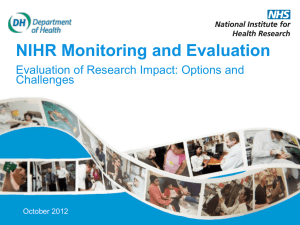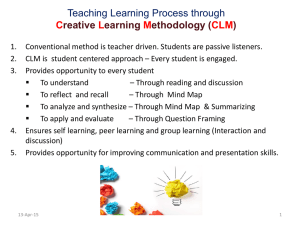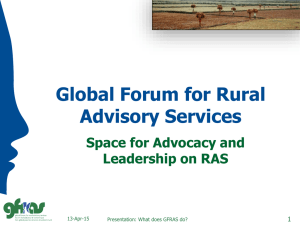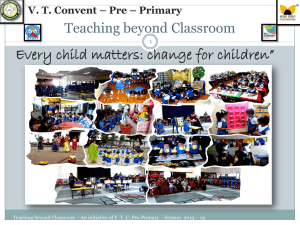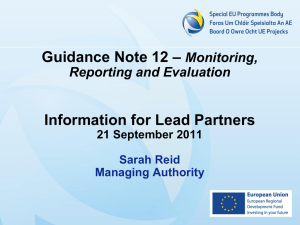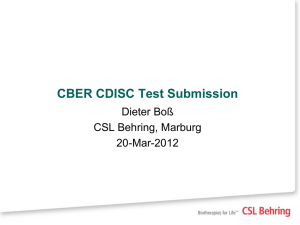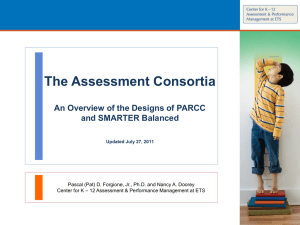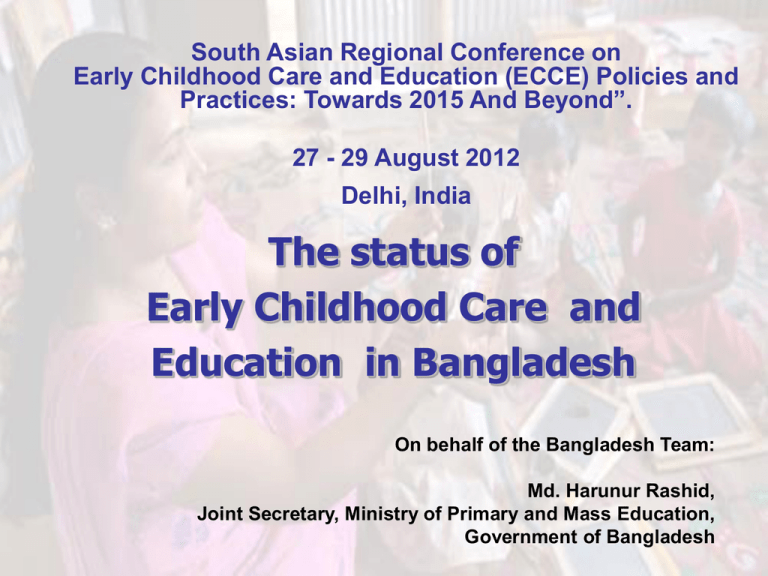
South Asian Regional Conference on
Early Childhood Care and Education (ECCE) Policies and
Practices: Towards 2015 And Beyond”.
27 - 29 August 2012
Delhi, India
The status of
Early Childhood Care and
Education in Bangladesh
On behalf of the Bangladesh Team:
13-Apr-15
Md. Harunur Rashid,
Joint Secretary, Ministry of Primary and Mass Education,
Government of Bangladesh
1
Country Profile
People’s Republic of Bangladesh has emerged as an independent
country in December 1971. It is a densely populated country with
the following demographic features:
Total area : 147,570 sq. kilometres
Population : About 152.51 million (M:76.35 m, F:76.16 m)
Population growth rate : 1.37 percent
Density of Population/sq. Kilometre: 1015
Life expectancy: 64.5 years
Literacy rate: 59.82%(15 years+)
The estimated per capita income : US$ 848
Division : 6 , District : 64 , Upazila (sub-district) : 503
Union : 4484 , Village : 87319 ,
Urban population :22 % , Rural Population : 78%
13-Apr-15
2
Background of ECCE in Bangladesh
Early childhood development initiatives got momentum from late
nineties though some scattered initiatives were there even from
1972. (Govt. day care centers –1984, Concern-1972, SC-USA –
1983);
Although government’s commitment were reflected through
different plans and policies (PRSP, NPAC), first initiative on
school readiness was implemented through Informal Education
Project in 1991 (Coverage was 63000 children);
However, concept, practice, development of models came form NGOs
such as : Plan Bangladesh-1997, SC-USA- 1998, GSS – 1996, Phulki –
1996, BRAC – 1997, VERC – 1997, ECD Unit – 1997 (Plan & Save), GS
– 2005, DAM -2005;
13-Apr-15
3
Government Commitment:
International
Both the World Declaration on Education For All (Jomtien, 1990)
and the Dakar Framework for Action (2000) have underscored
the importance of Early Childhood Care and Education (ECCE) as
part of a comprehensive approach to achieving Education For All
(EFA).
Several international and national commitments of the
Government of Bangladesh, besides the EFA commitments
(1990 and 2000) are relevant for policy and operational
guidelines in early childhood development. These commitments
relate to the UN Convention on the Rights of the Child (1989),
Convention on the Elimination of All Forms of Discrimination
Against Women (1979) and the Millennium Development Goals
(2000) adopted by the United Nations.
13-Apr-15
4
Government Commitment:
National
Constitution of Bangladesh (1972);
First Education Commission (1974);
National Plan of Action for Children(2004-09);
EFA NPA-II(2005-09);
Non-formal Education policy- 2006;
PPE operational Framework -2008;
National Education Policy -2010;
National Children Policy -2010;
Sixth Five year plan(2011-2015);
Third Primary Education Development Programme
(PEDP-3)- 2011-2016
Comprehensive Early Childhood Care and
Development (CECCD) policy -2012 (draft)
13-Apr-15
5
Commitment to practice
Pre-primary education under INFEP project (1991);
Government circular on “baby classes” in primary schools
(1994);
A Primer for Pre-Primary Education published (1997);
Pre-primary classes in Govt. primary schools by BRAC and
Save the Children(2002) and Plan Bangladesh (1997);
Early Learning Centres and Preschools implementation by
1st national project of BSA/MOWCA with UNICEF/Plan
support – preschools in CHT & other locations (2000-06);
2nd phase of national project – Early Learning centers with
preschool/playgroup in CHT and other remote locations
(2006-12).
13-Apr-15
6
Commitment to practice
Continued...
It was only 2001, when government launched the first
national project on Early Childhood Development
through BSA of MOWCA with the technical support from
Plan Bangladesh and financial support of UNICEF.
GoB is working on ECD focusing on program model
development, curriculum/material development,
awareness building, professional development, service
delivery etc.
13-Apr-15
7
Major achievement under first national
ECD project (2001-2006)
Awareness raised at all level ( from policy to family) through an
advocacy and communication campaign;
With the support from UNICEF and experienced NGOs ( Plan Bd,
BRAC, GS), government designed pre-school model and started
to pilot in CHT areas from 2002 and plain Land (rural & urban)
from 2003.
Strengthened institutional and professional capacity of
government and partners for implementing ECD activities;
With the support of NGOs ( SC-USA, Plan Bd, FIVDB, CAMPE and
others) and Institute of Educational Development, BRAC
University established a network called BEN comprising all GO,
NGO,UN and Institutions working in the field of ECD in
Bangladesh;
Initiated 2nd phase of the project called ELCD project by shifting
focus from family to early learning center;
13-Apr-15
8
Major achievement under 2nd phase
national ELCD project (2006-2010)
Established around 8000 early learning centres ( Pre-school &
Play group) through government and NGOs structure in urban
and rural areas including CHT, refugee camps, tea garden,
central jails etc ;
Incorporated ECD module in to medical professional course
(Under graduate, post graduate course and nurses course) ;
Incorporated ECD module into training course of government
health and family welfare’s field level workers and field level
managers.
Draft comprehensive ECCD policy and ELDS developed and
currently under MOWCA for approval;
Initiative taken to mainstream school readiness initiative
through government system;
13-Apr-15
9
Shifting mandate: MOWCA to MOPME
Gradually the focus and mandate of pre-schooling shifted from
Ministry of Women and Children Affairs (MOWCA) to Ministry
of Primary and Mass Education (MOPME).(2006-2007);
Pre-schooling becomes a priority agenda for government to
ensure quality primary education and address dropout,
retention, attendance and even enrollment;
MOPME, under Primary Education Development Project
(PEDP)- II a joint collaboration of GOB & 9 DPs and with the
support of BEN has taken initiative to develop an operational
framework for pre-primary education. (2007);
Pre-primary education operational framework developed and
approved by MOPME with a provision and guideline to
introduce one year pre-school program through primary
school.(2008);
13-Apr-15
10
ECCE framework-2008 and pre-primary
education
In keeping with EFA goals, GoB recognizes the need for and
importance of early childhood care and pre-school education
for children in the age range of 3-below 6 years to ensure
the well being of children, their physical and mental
development and effective participation in primary
education.
The specific objective of pre-primary education is to provide
all necessary care and education to young children for their
development through physical, cognitive, linguistic, social
and emotional growth. The operational framework provided
a matrix of developmental domain, curricular framework
and operational strategies with a future direction
13-Apr-15
11
ECCE framework-2008 and pre-primary
education
Continued...
At present, pre-primary education program is serving
children aged 5 to below 6 years in all over Bangladesh with
priority to children of poor families, disadvantaged
communities, ethnic minorities, children with various
disabilities, and children living in geographically remote
areas. The ultimate target is to cover all the children of 3 to
<6 age group throughout the country.
13-Apr-15
12
Objectives of ECCE and Pre-Primary
The specific objectives set in ECCE framework would include, among others,
the following:
a. To provide all the necessary care and education to young children that will
help their development through physical, cognitive, language, social,
and emotional growth and change; with due attention to children of
disadvantaged groups, children with special needs, and children of ethnic
minorities.
b. To support language development of children through active interaction
among and with children and creating opportunities for using the skills.
c. To support parents and other caregivers by providing knowledge and skills
necessary to meet children's developmental needs.
d. To create a congenial and child friendly atmosphere at home, community
and places of learning so that children benefit fully from care and learning
activities.
e. To develop and train the trained human resources and support them
effectively to carry out their work in early care and education of children.
13-Apr-15
13
Pre-primary learning outcomes set in
ECCE framework
Participant children in the pre-primary education, on completing
the course, will be able to:
a. Say own name, name of parents, address of family and own
date of birth,
b. Say names and function of different parts of the body,
c. Follow social practices - say greetings, respect elders, giving
thanks, ask permission and engage in appropriate social
interaction with relatives and friends,
d. Recite children's rhymes, sing children's songs, national
anthem and tell stories,
e. Categorize similar objects/articles and differentiate dissimilar
objects or articles,
f. Draw and name circle, triangle, rectangle.
13-Apr-15
14
Pre-primary learning outcomes set in ECCE
framework continued…
g. Recognize and tell the names and functions of natural objects
around them e.g., flower, fruit, fish, bird, animal, sun, moon, tree,
transport, weather, land and water,
h. Show creativity by making objects, toys/ play materials by self
choice using block, clay, leaf, paper, sticks etc.,
i. Count, recognize, read and write numbers from 0-20,
j. Do simple addition and subtraction (with numbers below 10),
k. Recognize, read and write Bangla letters,
l. Read and write words composed of two Bangla letters,
m. Describe events from picture,
n. Have an expressive vocabulary of words presented in Class 1
reader,
p. Recognise or say opposite word for known word.
13-Apr-15
15
Core materials for pre-primary education
Implementation of the pre-primary education curriculum will require the
preparation and availability of the following materials:
■ The curriculum content,
■ Trainers' manual,
■ Teacher's guidebook/manual,
■ Set of toys/ blocks for play,
■ Children activity book/exercise khata,
■ Alphabet chart/ alphabet blocks/0-20 number blocks,
■ Bangla primer,
■ Math primer,
■ Picture book providing new and known environmental objects,
■ Number chart,
■ Story books.
NCTB is committed to develop these materials with the help of the
experts in this field by December 2012 so that these could be distributed
by January 2013 in PPE classes
13-Apr-15
16
Supplementary materials
The following materials will be desirable to have in preprimary education centers and should be progressively made
available:
■ Pictorial books,
■ Health and environment charts,
■ Story cards,
■ Word, number and memory games,
■ Audiovisual materials.
NCTB will also develop the Supplementary Reading Materials
through engaging experts.
13-Apr-15
17
Operationalizing the policy into
practice
Initiative taken by the Directorate of Primary Education
(DPE) to implement PPE operational framework ,engaging
development partners, academicians and professionals.
High level technical and coordination committees on
PPE has been formed and activated by MOPME with
representatives from GO NGOs and DPs.
PPE national curriculum is approved and overall
package development is underway with technical
support from UNICEF by NCTB involving
representatives from BEN and other relevant
Stakeholders;
13-Apr-15
18
Operationalizing the policy into
practice contd ….
With support from UNICEF, interim PPE package developed
and introduced through government primary schools (37672
GPS & 22961 RNGPs by 2011);
Interim training and orientation plan on PPE developed and
implemented by DPE;
GO-NGO collaboration guideline and implementation plan
have been approved;.
Every school shall have pre-primary class by 2013;
National Education Policy 2010 approved with a provision of
one year pre-primary for children of 5–below 6 years and
gradually it will be extended for 4+ children ;
13-Apr-15
19
Capacity Building
To introduce PPE at every primary school all the field level
Officers related to Primary Education were oriented on
PPE;
64 ADPEOs, 108 PTI Instructors, 1006 Instructors & Asst.
Instructors of URC and 503 AUEOs were trained up as TOT
on PPE interim package in the year 2009-2010;
One teacher from each GPS (37672) and 2243 teachers
from 2243 RNGPS were trained up on the PPE interim
package;
All of the Head Teachers were oriented with PPE;
Post of 37672 teachers created to serve PPE;
Content on Preschools, early childhood issues have been
incorporated into the Diploma in Education Courses for all
primary school teachers
13-Apr-15
20
Children Aged 4 and 5 Years by Sex
according to Population Census -2011
Age (Year)
Total
Male
Female
4
3399739
1733058
1666681
5
3660286
1884474
1775812
Total
7060025
3617532
3442493
13-Apr-15
21
Number of Schools and Pre-Primary Enrollment
as per ASC- 2011
Total Number
of
Schools
School type
Enrolled Students in PPE
No. of Schools
with PPE
Boys
Girls
Total
GPS
37672
35396
616820
596330
1213150
RNGPS
20168
11314
171933
170995
342928
1485
828
16072
15579
31651
Expremental School
55
6
110
81
191
Ibtedayee Madrasha
2062
853
13719
12917
26636
10537
10065
313399
257675
571074
NGO School (Class 1-5)
1936
570
10656
10137
20793
Community School
3133
1770
25492
25986
51478
High Madrasha Attached Ibtedayee
4366
1614
24294
23318
47612
High School Attach Primary
1494
907
33963
32987
66950
BRAC Center
4390
12
1229
1819
3048
ROSC
2344
2
61
50
111
70
11
273
251
524
89712
63348
1228021
1148125
2376146
NGPS
KG
Shishu Kollan
Total:
13-Apr-15
22
Number of students in Grade 1 with
Pre_primary experience 2011
School type
Boys
Girls
Total
GPS
502497
516315
1018812
RNGPS
191996
192209
384205
14624
14134
28758
222
238
460
18084
17109
35193
145135
119561
264696
8069
7890
15959
Community School
23583
23933
47516
High Madras a Attach Ibtedayee
35413
32312
67725
High School Attach Primary
31100
32773
63873
BRAC Center
180
246
426
ROSC
657
583
1240
Shishu Kollan
265
234
499
971825
957537
1929362
NGPS
Experimental School
Ibtedayee Madras a
KG
NGO School (Class 1-5)
Total
13-Apr-15
23
Number of Schools and Students by type
in 2011
Total Teachers
School type
No. of
Sch
ool
Total
Female
Total Students
% of
Fem
ale
Total
Girls
% of Girls
GPS
37672
201900
124625
61.7
10687349
5450638
51.0
RNGPS
20168
73211
26580
36.3
3838932
1936115
50.4
1485
6045
4110
68.0
223295
111479
49.9
Expremental School
55
216
176
81.5
10072
4934
49.0
Ibtedayee Madrasha
2062
10059
1572
15.6
309479
152557
49.3
10537
98119
58419
59.5
1227239
545977
44.5
NGO School (Class 1-5)
1936
5022
3512
69.9
142618
75440
52.9
Community School
3133
9972
7550
75.7
508862
259926
51.1
High Madrasha Attach Ibtedayee
4366
26055
3349
12.9
747321
365856
49.0
High School Attach Primary
1494
21292
10460
49.1
506183
255536
50.5
BRAC Center
4390
4096
4027
98.3
149852
93339
62.3
ROSC
2344
2191
1777
81.1
73566
37276
50.7
70
211
149
70.6
7731
4246
54.9
89712
458389
246306
53.7
18432499
9293319
50.4
NGPS
KG
Shishu Kollan
Total
13-Apr-15
24
Other Achievements
Mothers assembly is held in school regularly and they are
informed and advised on children’s nutrition, health, cognitive
and social development;
Following poverty map, mid day meal –fortified biscuit of 75
gram is given to poor children in extremely vulnerable areas;
Presently teachers for grade 1-5 teach in pre-primary; new
teachers are required to operate pre-primary classes and at
least 15000 will be recruited in 2012;
Enrollment reached 99.47% by 2011,drop-out reduced from
50% to 39.8% over last three years after implementation of
Preschool in primary schools and other ECD projects by
development agencies;
13-Apr-15
25
Major program for next five years
One year pre-primary class will be implemented as an integral
part of primary education development program (PEDP-3)
with the provision of:
Appointment of 37,672 new teachers for PPE;
Construction of 31,685 new class rooms;
Installation of 39,300 tubewells,127955 toilets for boys
and 15246 for girls;
Incorporation of PPE module in Diploma in Education
curriculum;
Establishment of PPE unit in Directorate of Primary
Education;
Introduction of Minimum standard and monitoring
system;
Partnership with NGO and private sectors (PPP);
Alternative approach for marginalized groups;
Involvement of community;
Strengthening Institutional and professional capacity;
PPE mapping, Data base and expansion plan ;
13-Apr-15
26
Challenges
Resource mobilization for PPE;
Training and capacity building of of all Primary School
Teachers, supervisory staff;
Social mobilization and awareness buildup activities among
stakeholders;
Coordination among ministries, NGOs and DPs;
Developing and expanding ECD services for young
children(4+) according to National Education Policy-2010;
Ensuring program support for the disadvantaged people and
hard to reach population, particularly urban working parents,
hilly areas, coastal belt, haor and char people;
13-Apr-15
27
Challenges
contd…
Making ECCE services inclusive – especially
developing and expanding programs for early
detection and care of children with special needs;
Priority and urgency in policy initiatives – especially,
comprehensive ECCD policy and measures to
implement the revised national child policy & national
education policy.
13-Apr-15
28
Conclusion
Despite funding constraint GoB has been implementing
PEDP-3 with a total fund layout of US$8.3 billion from 2011
to 2016. Nine DPs committed US$1.055 billion and the rest
will be from GoB revenue;
PEDP-3’S Goal is to provide” quality education for our
children”;
Specific objective has been set to establish an efficient
inclusive and equitable primary education system delivering
effective and relevant child-friendly learning to all children
from pre-primary through Grade- 5 primary;
Despite all limitations, an efficient program structure with
technically sound human resource could ensure a proper
beginning of the ECE-the pre-condition for quality primary
education. Bangladesh is advancing though slowly but with
an steady step.
13-Apr-15
29
13-Apr-15
30

